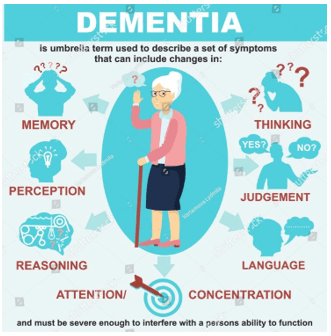A nurse is caring for a client who has dementia.
Which of the following findings should the nurse expect?
Memory loss that disrupts ADLs
Catatonia
Illusions
Pressured speech
The Correct Answer is A
a. Memory loss that disrupts ADLs
Explanation: Dementia is a condition characterized by a decline in cognitive function that affects a person's ability to perform activities of daily living (ADLs). Memory loss is a common symptom of dementia, particularly in the early stages. The memory loss can disrupt a person's ability to carry out tasks they were previously able to do independently, such as dressing, bathing, and eating. Therefore, option a is the correct answer.
Option b, catatonia, is a condition characterized by a lack of movement or activity, which is not typically associated with dementia.
Option c, illusions, involve a misinterpretation of sensory information and may occur in some forms of dementia but are not a defining feature.
Option d, pressured speech, is a symptom commonly associated with mania or bipolar disorder, but is not typically seen in dementia.

Nursing Test Bank
Naxlex Comprehensive Predictor Exams
Related Questions
Correct Answer is C
Explanation
When collecting data from a client who is receiving gentamicin via IV infusion, the nurse should identify the new onset of hearing loss as an adverse effect of the treatment¹. Gentamicin can cause vestibulocochlear nerve damage, which can affect hearing and balance¹.
Correct Answer is B
Explanation
Range-of-motion exercises can be safely performed by assistive personnel under the supervision and direction of the nurse. It helps to maintain the mobility and function of the client's hands while in restraints.
Whether you are a student looking to ace your exams or a practicing nurse seeking to enhance your expertise , our nursing education contents will empower you with the confidence and competence to make a difference in the lives of patients and become a respected leader in the healthcare field.
Visit Naxlex, invest in your future and unlock endless possibilities with our unparalleled nursing education contents today
Report Wrong Answer on the Current Question
Do you disagree with the answer? If yes, what is your expected answer? Explain.
Kindly be descriptive with the issue you are facing.
